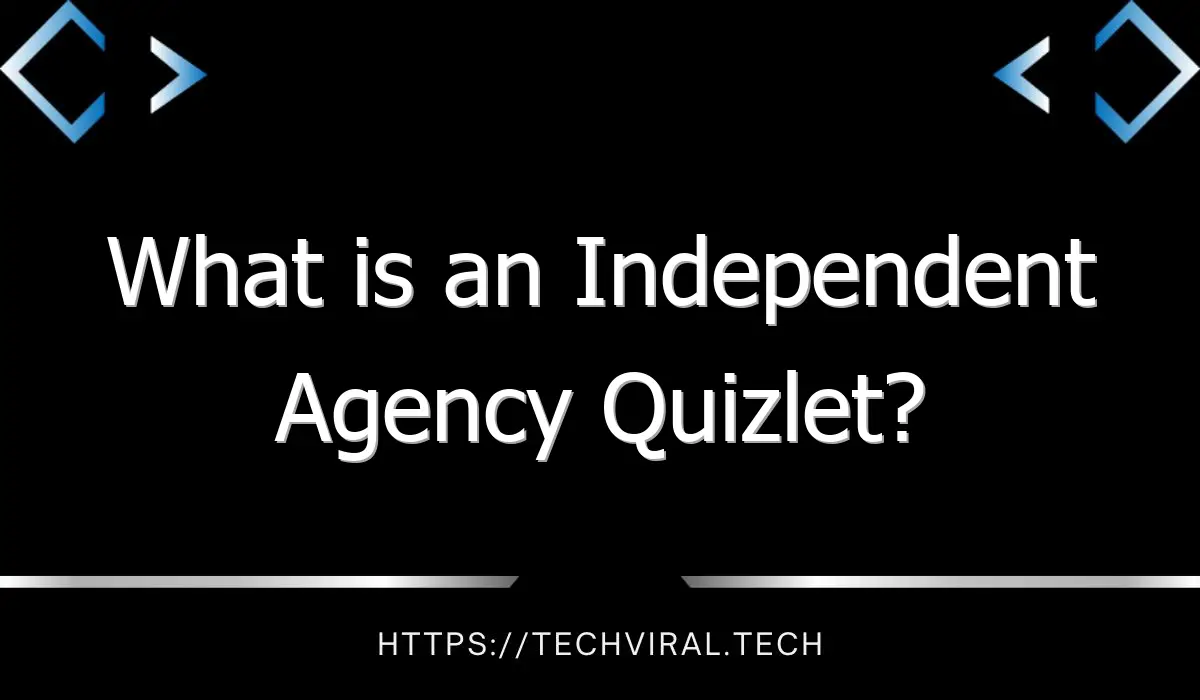What is an Independent Agency Quizlet?
This article will cover the basics of independent agencies: the types, governing bodies, terms of office, and location within the federal government. In addition, it will discuss the history of independent agencies, questions and answers, and the role of federal commissioners. Once you’ve completed this quizlet, you should know a bit more about federal agencies and what makes them unique. To help you succeed in this endeavor, we’ve provided a link to a free study guide on the topic.
Questions and answers about independent agencies
The term independent agency is used to describe agencies that are run independently from the federal government. These agencies have different jurisdictions and responsibilities. Some are responsible for supervising particular sectors of the economy while others perform specific governmental services. Perhaps the most notable of these agencies is the Central Intelligence Agency (CIA), which coordinates national security and information gathering. The CIA recruits secret agents to collect information and conducts investigations to identify potential threats. After gathering information, CIA analysts use that information to make recommendations to the National Security Council.
An independent agency’s board of directors is different than its executive counterparts. While executive agencies have a single director, secretary, and administrator, independent agencies generally have a five-to-seven-member board. Board members are appointed by the president and confirmed by the senate. Their terms are staggered to prevent a complete turnover. Most independent agencies have bipartisan rulemaking requirements, so the president cannot fill vacancies with members of his political party.
Governing bodies of independent agencies
In the United States, independent agencies are entities that are independent from federal executive departments or the Executive Office of the President. Independent agencies are created to provide services and to perform certain functions outside the executive branches of the government. Such agencies have separate governing bodies that are independent of the executive departments. The purpose of independent agencies is to achieve public benefit. The governing bodies of independent agencies have broad powers to implement public policy and provide services.
As the name suggests, independent agencies are distinct from executive branches. They operate independently, but are subject to the same laws and regulations as the rest of the federal government. Because independent agencies are not part of the President’s cabinet, they are not directly under the President’s supervision and cannot be subject to presidential directives. In other words, independent agencies have the authority to act as they see fit. They are also not directly controlled by the president, but rather by a separate congressional act.
Unlike executive agencies, independent agencies are run by a board or commission. Boards or commissions typically consist of five to seven members. Board members are appointed by the president, subject to senate confirmation. Members serve staggered terms to avoid complete board turnover. Independent agencies have statutory bipartisanship requirements. Despite the independence of the agency, the president cannot remove any board member without good cause. They are required to comply with the bipartisan principles of the federal government.
While some agencies are independent, many are still part of the executive branch. They have the authority to regulate specific industries, and their regulations have full force. They also have the power to enforce rules and adjudicate matters as outlined by statute. If these standards are not met, the independent agency must take action. The federal government often provides them with a mandate to enforce regulations and protect the public. Therefore, independent agencies are an important part of the government.
While some agencies carry similar functions, there is a marked difference in the type of functions performed by these agencies. For example, most independent agencies focus on administrative law. These agencies analyze various rules and regulations, evaluate the effectiveness of rulemaking processes, and codify various rules. As a result, they perform a more regulated role than their executive branch counterparts. They also carry out more complex tasks that require specialized expertise.
Terms of office of commissioners
Independent agencies, such as the Federal Trade Commission (FTC), can have multiple members and their terms of office can be as short as one year. Although the president has the power to appoint and remove the agency’s officers, Congress has the power to limit this power. Although the Constitution vests the powers of appointment and removal in the president, the Senate participates in the process of appointing agency heads through “advice and consent” votes.
There are five full-time members of the FTC, which are appointed by the president and confirmed by the U.S. Senate. The President appoints one commissioner to be chairman, and no more than three members can be of the same political party. In addition, none of the commissioners can have a financial interest in the commission’s business. Moreover, the terms of office of each Commissioner are staggered so that one member’s term ends every two years. The commission’s meetings are held in both public and closed sessions.
The terms of office of commissioners for an independent agency vary according to the type of office. Some can hold elected positions in a partisan local office while others serve as members of legislative bodies or committees. Some may hold other non-partisan positions such as city council members or local school district board members. The Commission may also be composed of non-partisan members from a broader range of backgrounds. It is also important to note that the terms of office of a commissioner of an independent agency are limited by state law.
The terms of office of a public service commission’s chairperson are determined by law. The governor appoints the chairperson. The chairperson serves for a two-year term, and can be reappointed or removed. The chairperson is appointed by the governor and appoints the other commissioners. The commission also appoints the commissioners of the labor and industry review commission.
Location of independent agencies in the federal government
Regulatory agency independence is a central principle of the American system, and independent agencies enjoy relative independence from political oversight and ballot box control. In contrast, cabinet agencies are subject to political oversight. In the United States, the independence of independent agencies is the result of a constitutional mandate to faithfully execute laws passed by Congress. However, these agencies have varying degrees of independence. As a result, many of them lack full independence.
Independent agencies vary in jurisdiction, with some regulating specific sections of the economy and performing specific governmental functions. The CIA, for instance, coordinates the investigation and information gathering of national and international security. Secret agents are hired by the agency to gather information. They analyze this information and make recommendations to the National Security Council. While the CIA is independent of the federal government, it is considered an extension of the U.S. government.
The president can remove the head of an independent agency if he complies with the statutory requirements. However, he can also remove a board member for incompetence, neglect of duty, incapacity, or another form of good cause. Because of these limitations, it is unlikely that a member of Congress can serve as a commissioner of an independent agency with executive powers. So, while the president’s authority over appointment matters is restricted by the Constitution, it is still not enough to limit the power of the executive branch.
The federal government has several independent agencies, which can be regarded as its main operating bodies. The Environmental Protection Agency, which was established in 1970, coordinates various state and local environmental protection programs. It regulates the use of pesticides, and a range of other complex areas. But it does not directly report to the president. As a result, its regulations are enforceable under federal law. The United States has a strong federal environmental protection system and this agency is a key part of it.




